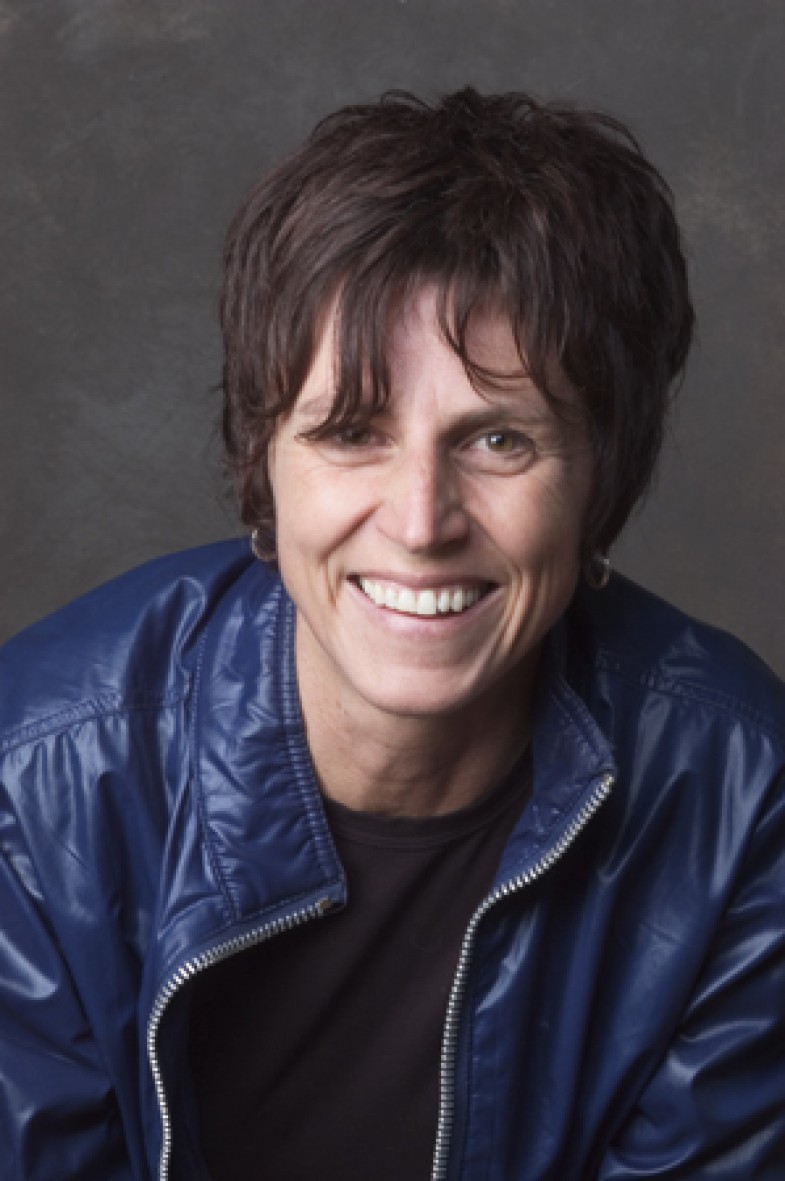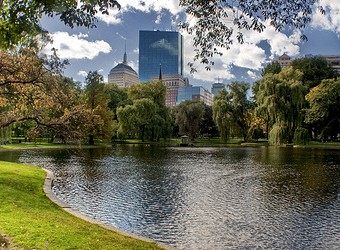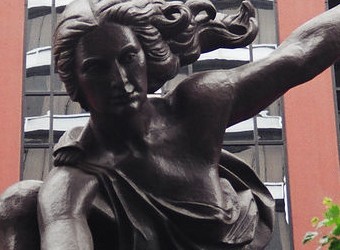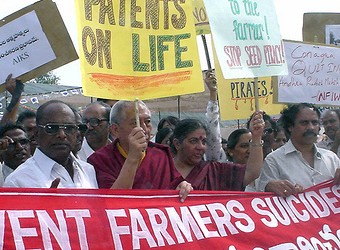Juliet Patterson is a Minneapolis-based poet, teacher, and community activist who serves as an advisor to Commons Magazine’s new poetry series, UNCOMMON/WORD. (Learn about our Arts and Culture department, how to submit to UNCOMMON/WORD, and more here.)
I had the pleasure of meeting Patterson in 2004 when we were both fellows at the Institute for Community Cultural Development, a leadership development program for community-engaged artists, activists, and developers. Her unique vision and deep commitment to art in service to community made her a perfect guide for Commons Magazine’s poetry column that features commons-inspired work from poets across the world.
Patterson was selected by poet Jean Valentine to become the inaugural recipient of the prestigious Nightboat Poetry Prize, and published her first book, The Truant Lover, in 2006. Since that time she has written a second full-length book of poetry, published the chapbook, Dirge, become a parent, and suffered the unexpected death of her father. She is currently writing a memoir entitled, Sinkhole: A Natural History of Suicide.
I recently had the opportunity to ask Patterson a few questions about her writing practice and its connection to the commons.
— Camille Gage, On the Commons artist in residence
Share with us your thoughts on the role of poetry and other literary genres as part of the commons.
Poetry in its long history has always provided a space for people to come together at traumatic or transitional points. That’s why poetry is often read at funerals and births and weddings. After 9-11 there was a huge up-swelling of poems being written, and written by everyone, not just by poets. Buried deep down inside us is a natural tendency to want to express ourselves at moments like that and I think language is one of the easier forms of expression because it is something we use every day; it’s likely the only tool, of all of the art forms, that we use every single day.
I feel like there’s a reason why memoir is currently selling more than other literary genre. There’s something going on. It’s time for us to really get to the bottom of who we are and to share our stories. The stories are what connect us and bind us and it’s how we can start to begin to share resources of all kinds. But first we have to tell our stories.
Poetry and music are the only two art forms that can be found in every known culture on the planet. I therefore see myself as one of many voices and consider poetry a collective affair, not just a personal, ego-driven experience.
One of my heroes – and to me she embodies the spirit of the commons – is Lorine Niedecker. She lived in Wisconsin and was a librarian and a janitor and grew up very poor. Lorine wrote poems on calendars, and in the margins of cookbooks. She typed up her poems and distributed them to friends. She would seal them inside letters. She would leave them in the library. She would pin them up on the wall of the school where she mopped the floors.
Eventually Louis Zukofsky, a very famous poet living in New York, was sent one of her poems. He was mesmerized by her work and helped her get her first book published.
There’s something about Lorine’s spirit that I find incredibly inspiring. I especially love how she disseminated the work. Even when she got her work published she just gave it away – literally gave her books away – to strangers, to people on the street. She really thought of herself as a poet in her community. And she wasn’t worried about what that meant professionally, or about being famous. She wasn’t worried about publishing and making money from her work. None of it. She just wanted to write poems and give them away.
What drew you to a life in poetry?
I think most artists and writers discover quite young if they’re interested in a certain discipline, and for me it was an early love of language.
I don’t come from a family of storytellers. I was fortunate to have had two elementary school teachers who had a big influence on me. My second grade teacher introduced me to poetry. My sixth grade teacher, Virginia Frost, used to open every class by reciting a poem. She was also an actress at the Guthrie Theater and so she had an incredible presence – and that was it. I fell in love with the vehicle of a poem. There was something about the performative aspect of poetry that really captivated me.
That was one of the questions I had for you, to ask about your thoughts on the different ways to experience poetry. In other words, do you favor hearing it or reading it?
Ironically I am not really a performance poet, but I think it’s that element of poetry that is ‘why I’m in the game’ so to speak. To my mind it’s what separates poetry from fiction and nonfiction. Poetry is meant to be heard. It’s spoken through the human voice and it is meant to be put out into the air.
I find that very compelling, that poetry is language embodied.
Poetry has its origins in song. Poetry was originally performed orally because it was a song, literally. We don’t exactly know what that music sounded like. It could have been very monotone, or rhythmic like a chant. For me that musical element has always been really dominant.
I’m attracted to the musicality of poetry and what that allows. And because it’s a distilled form you can perform a ‘story’ in a condensed time. That’s a very different experience from reading a novel, let’s say.
Talk about your creative process and philosophy.
I’m always reminded that Kafka had a sign above his desk that sad, “WAIT.” When I teach I always say that if there is any formula I have about writing, that’s it: WAIT.
Poetry is about listening: listening to an inner music or voice, and also listening to what’s happening around you and then somehow weaving those things together. That’s my basic philosophy about poetry.
When it comes to my creative process I’m intentionally slow for that reason. I spend a lot of time just waiting and listening. Staring out the window or reading. It’s a very meditative process. Or at least at its best I’m trying to recreate a very meditative process, trying to mimic something that might look like meditation.
It reminds me of what yoga practitioners call dharana, or single point focus, which means trying to remove all the mental clutter of life and focus in an exclusive way.
It’s paradoxical because it’s not exactly an empty mind. Ultimately you’re creating, you’re making, you’re thinking, you’re making a mark on paper; but first I have to feel like I’m empty or it doesn’t feel as authentic.
You define your work as abstract poetry, and I’m interested in talking about that genre. It’s often non-linear and requires surrender to words without the usual narrative vehicles the mind hopes to cling to. I’ll be candid and say I often find it very challenging.
There’s a wide continuum in the world of poetry. As I mentioned earlier, poetry began in song. So you might say that poetry has progressed from song to story to argument. In the 17th century it was very important to show how well you could argue, which is what sonnets are about; how smart you could be, how clever you could be.
So all of this is part of the history of poetry. In America we’ve gravitated to the story. When it comes to language we expect a story. It’s how we make sense of our lives, by telling stories. So I think anything outside the realm of a story-driven poem could be thought of as abstract. I lean toward the expressiveness of a song. Consider a pop song, for instance: you don’t necessarily expect a whole story to be told. You are just carried away by the evocative nature of the words and music.
Lately I’ve just been listening a lot to Revolver, the Beatles album, and it’s an excellent example. There are a lot of weird songs on that record that don’t mean anything. But they’re great songs.
It’s about the reader’s expectation. I haven’t been interested in telling stories as much as creating an atmosphere or a feeling. It’s very much akin, in my mind, again, to music, where the reader has a sensation or a feeling or walks away from a poem with one line repeating in their head. That would be enough for me.
That’s very illuminating. You give the reader a lot of freedom to simply ‘be with’ the poem.
You often reference the writing of other poets in your work. What advice do you have for someone, and I include myself here, who is not really well versed in the canon? How do we enjoy and get the most out of the experience of reading poetry with references we don’t always understand?
I did a lot of that in my first book; my second book has far less. For me it was a way of paying homage to those voices that were really instructive to me. I try to footnote those things the best I can and the hope is that if you’re inspired by that poem or that language that you’ll take the time to find out who those poets are.
You were the recipient of the inaugural Nightboat Poetry Prize and published your first book as a result. What went through your mind when you heard? How did you react, and what has this meant for your career?
I was in shock. The judge for that contest, Jean Valentine, was a poet I had admired for many, many years. It all seemed like a dream until I had the book in my hands, and that whole process took about a year.
I bristle at the word career.
Why is that?
It’s such a dilemma because part of being a writer is publishing, so that you can share the work, but there are so many issues with publishing. I’ve had a very positive experience with Nightboat and obviously the first book is a very big hurdle to cross. At the same time I’ve had to confront myself and be really honest with myself about what all this has meant to me professionally. Is poetry a career? No. It’s a vocation. It’s a practice. I view it as a practice. And I think it gets complicated once you enter the realm of publishing and the professionalization of something that I will do nevertheless.
That said, Nightboat is a fantastic press. Through their process I was able to meet Jean Valentine who is now a dear friend, and that doesn’t always happen. In the end what’s truly valuable is the relationships poetry has brought into my life, rather than my earning potential.
You have an unusual personal history and recently completed a successful crowd-sourced fundraising campaign to support the writing of a memoir titled, Sinkhole: A Natural History of Suicide. How different is writing a memoir as opposed to poetry? And can you tell us a little about your experience writing about something so deeply personal in nature?
There is a book of poems I wrote in between the first book (Truant Lovers) and the current project. I haven’t yet published it. It’s titled Threnody, which means the lament of a collective voice. I am really upset about the changes in our environment and the lack of attention it’s receiving in the political arena. I began Threnody in 2008 and things are slowly changing in term of awareness, but global climate issues continue to get worse. I found myself trying to address this through poetry.
After I finished that book I started writing some essays, mostly inspired by people like Scott Russell Sanders and Terry Tempest Williams, who in my mind are really ‘on the ground’ in trying to witness some of these issues and give them voice.
Then my father died in 2008. He took his own life. I was thrust into a process of writing about that, and because I am a writer and that is my practice it started to move beyond just a personal exploration. I felt the potential to write something more universal. And somehow in my mind—I’m not sure I can articulate this yet—the parallel of an environment that’s being degraded by the people who live within it became a metaphor for a person who is suffering from something—usually it’s mental illness—that is debilitating and which threatens their own life.
Those two things seemed to be in conversation, and as I progressed through my own grief I heard from others who are likewise survivors of suicide, that these stories aren’t being told. That the stories are being buried, and that felt like a parallel, too, in terms of facing the truth about what we’ve done to our environment and what we have ahead of us.
So it became something of a calling, a call to action, literally, to somehow give this voice. It’s a very personal story but the hope is that the personal is political, to quote Adrienne Rich. I also continue to remind myself of something Scott Russell Sanders says: that in the whole realm of activists he views writers and artists as the people who have the potential to raise questions and perhaps raise consciousness as well. It’s a tall order and difficult to remember when you’re locked in your room struggling over your personal narrative.
I often feel so ignited around the issue of the environment that I fall into fear that I am not doing enough, but I’m not an activist in the classic sense. I don’t have that skill set. My skill, as Terry Tempest Williams has said, is to witness, and to use a pen to give these urgent issues voice.





